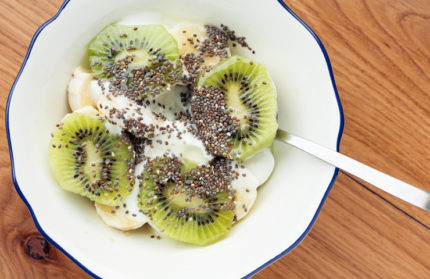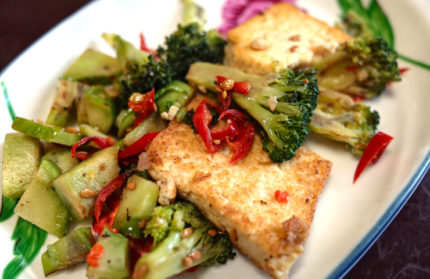Healthy Eating for Vegans & Vegetarians
Merely choosing a plant-based diet is no guarantee that you’re eating for optimal health.
 Whether you’re a veteran vegan or a newbie to a plant-based diet—or the parent of a vegan or vegetarian—it’s essential to educate yourself and be proactive about diet and lifestyle choices. Living a healthy vegan or vegetarian life comes down to planning and being knowledgeable about the food and nutrition requirements that will contribute to your success.
Whether you’re a veteran vegan or a newbie to a plant-based diet—or the parent of a vegan or vegetarian—it’s essential to educate yourself and be proactive about diet and lifestyle choices. Living a healthy vegan or vegetarian life comes down to planning and being knowledgeable about the food and nutrition requirements that will contribute to your success.
The advice below addresses some special nutritional challenges for those eating a plant-based diet.
Eat Enough Protein
Not only does protein contribute to our feeling of fullness, it’s critical to our nutrition and helps with the health of our muscles, blood, connective tissues and antibodies—not to mention the added benefits of healthy hair and nails.
The U.S. recommended daily allowance (RDA)—a minimum nutrition requirement—is 0.36 grams of protein per pound that we weigh. But vegans and vegetarians should increase that number by 10 percent (to 0.41 grams per pound) because some plant proteins don’t digest as well as animal proteins. For vegetarians, that’s 61.5 grams of protein per day for a 150-pound person.
Fortunately, there are many foods rich in protein and beneficial for vegans and vegetarians including quinoa, chickpeas, lentils, tofu, edamame, chia seeds, whole grains, seitan, nuts and nut butter.
If you’re a vegetarian who eats eggs and dairy products, it’s easy to get generous servings of protein. A hard-boiled egg, for example, has about 7 or 8 grams, depending on its size, and some Greek yogurts have as much as 18 grams of protein in a single serving.
Remember that because protein isn’t stored in the body, it must be replenished regularly.
Get Sufficient Iron, Zinc AND VITAMIN C
Iron helps our bodies produce red blood cells, which carry oxygen throughout the body. Without enough iron, we can become fatigued, irritable and dizzy.
Vegans and vegetarians are in luck: many plant-based foods—broccoli, beans, lentils, dried fruits—provide plenty of iron. Some of these same sources (beans, seeds, nuts) are also good sources of zinc, which is needed for metabolism. And interestingly, vegans and vegetarians are no more at risk for iron deficiency than meat-eaters.
Vegans and vegetarians must also be sure to include foods that are high in vitamin C to help with absorption of iron and zinc in our bodies. Some foods, such as broccoli, are blessed with both iron and vitamin C, so the work is done with one food.
Keep in mind that certain people are more prone to iron deficiency, such as menstruating women, pregnant women, teenage girls and the elderly. If you have concerns about iron deficiency, be sure to talk with your doctor.
Watch Your Calcium and Vitamin D
Calcium and vitamin D deficiencies are becoming more prevalant in vegans, vegetarians and meat-eaters alike. Calcium contributes to optimal bone health, and vitamin D helps with its absorption.
For vegans and vegetarians, it’s important to get these from sources such as fortified soy milk, orange juice or cereal, or from a vitamin supplement. Also, look for tofu options that are fortified with vitamin D.
 Check your Energy level
Check your Energy level
Vegans and vegetarians certainly aren’t the only ones who need an energy boost. Many people feel run down, fatigued and low-energy just going about their daily lives. Other factors—sleep, caffeine, sugar intake—also affect energy levels.
To get the energy needed, vegans and vegetarians should include a wide variety of plant-based whole foods at regular intervals throughout the day. This gives you a steady supply of nutrients, including complex carbohydrates and antioxidant-rich vitamins and minerals, while also providing increased energy.
Vegans and vegetarians must also be aware of their risk of having a vitamin B12 deficiency. Found almost exclusively in animal foods such as meat, seafood and some dairy products, B12 helps build DNA in the body, shields us against heart disease and stroke. Among its many other benefits, it also boosts energy.
A simple solution for adequate levels is to take a B12 supplement. Nutritional yeast, often used as a vegan substitute for Parmesan cheese, is also a good source of B12.
Avoid Boredom with your Plant-based Diet
Don’t let a plant-based diet fool you into thinking there aren’t enough options to keep your meals new, different and exciting. The variety of plant-based foods and combinations, as well as websites and recipe books with tips, are plentiful.
To eliminate boredom, try grilling or roasting vegetables. Or try making your own veggie burgers, whipping up a healthy smoothie or baking black bean brownies for a sweet treat. Salads can get an exciting boost when you add quinoa, sunflower seeds, nuts, dates, apples, edamame or chickpeas—all rich in iron and zinc!
You can also shake things up simply by going on a grocery shopping “adventure” and challenge yourself to reach for food items you’ve never tried before. Be spontaneous! Go online and search for a simple recipe that uses your new ingredients.
For Families with Kids on Vegan or Vegetarian Diets
Whether you’re a vegan or vegetarian who chose to raise your children the same way or if your kids chose to follow this diet on their own, parents should consult with a pediatrician or family doctor, as children’s nutritional needs differ from those of adults.
By eating a plant-based diet, you’re well on your way to optimal nutrition. But there’s always room for improvement. The nutritional journey is never over as your body, your health needs and lifestyle change over time. Keep making adjustments to ensure you’re getting the nutritional benefits from your food sources so you can live a full and active life.
To make sure you’re getting the proper intake of vitamins and minerals, and to ensure you’re making the best choices for optimal health and nutrition, schedule regular appointments with your doctor.
Judy Rodkey-Matusky, RDN, LDN, is a medical nutrition and education specialist at Main Line Health and an Adjunct Clinical Professor at LaSalle University, School of Nursing and Health Sciences. She’s a registered dietitian, licensed dietitian/nutritionist and is certified in child, adolescent and adult weight management. She’s also held positions as a clinical dietitian, certified fitness instructor and assistant director of health promotion.
